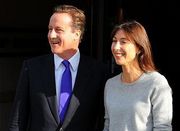 While were all waiting for the Cameron speech, I thought I’d post some of the out-takes of my interview with him last week (full text here). Many thanks for your suggestions for questions, which were disconcertingly good. When I was a trainee reporter, I went to a coroner’s court and noticed that the jury asked better questions than the lawyer. It’s often like that with CoffeeHouse comments: you guys had all the obvious and oblique angles covered.
While were all waiting for the Cameron speech, I thought I’d post some of the out-takes of my interview with him last week (full text here). Many thanks for your suggestions for questions, which were disconcertingly good. When I was a trainee reporter, I went to a coroner’s court and noticed that the jury asked better questions than the lawyer. It’s often like that with CoffeeHouse comments: you guys had all the obvious and oblique angles covered.
But I suspect that our little wiki-exercise forewarned Cameron a bit because he seemed to have ready answers. Every journalist leaves an interview thinking what was the top line in that? and if your subject is slick enough, there normally isn’t one. Apart from saying he’d like to be painted by Tracey Emin (something, I suspect, he instantly regretted). I’m beginning to think that Cameron is like Blair: impossible to wrong foot in an interview or press conference. What struck me last week was the obliging way in that he responded in three-minute blocks. A courtesy, because if the question isn’t working out for the interviewer you can try again.
We had just 42 minutes together, so I was not able to put the exhaustive range of questions that I did when we had a day together last May. But, for what it’s worth, here is what I didn’t fit in to the piece, and the context of some that did. The whole thing is a bit overwhelming, so we’ll post them in chunks. Here’s the first: Europe, Books and Art.
1. EUROPE – HE’D SEEK WITHDRAWAL FROM THE SOCIAL CHAPTER EVEN IF LISBON IS SIGNED
FN: The Irish will likely vote ‘yes’. Can you say anything to the Czechs to persuade them to hold out until after the election?
DC: Obviously I would like us to have a referendum. Some people might think this will all be better for the Conservatives if it all just went away; but no, I’d like to have a referendum. I want to have a referendum. We were promised a referendum, we deserve a referendum, we shouldn’t change our country in this way without having a referendum but let’s be clear, as I’ve said very clearly, I’m not going to say anything more until, unless or until this treaty is ratified and implemented by everybody. As long as it is out there being discussed by any country anywhere in Europe, we can have that referendum and we will. Full stop, end of story.
FN: You are committed to withdrawing from the Social Chapter, is that right?
DC: We think employment and social policy is an area where, it’s a good example of where Europe has gone too far.
FN: But I’m not clear whether this a pledge though that is dependent on Lisbon not being ratified? If it were, withdrawing from the social chapter would be more difficult.
DC: I made that pledge when Lisbon, before Lisbon was signed.
FN: Sure, but is your pledge contingent to Lisbon not being signed? If Lisbon is ratified would you still want to pursue that?
DC: I would want to withdraw from those things, yes.
2. ART & BOOKS & LIFE
FN; What British painter would you like to be painted by if you become Prime Minister? [Looks puzzled]. Well, they do tend to get painted.
DC: Living or dead?
FN: Living is the custom.
DC: [pause] Tracey Emin.
FN: Okay. Very good…
DC: That will be your cartoon anyway.
FN: And did you do any reading this summer?
DC: Yes, a lot. I’ve been reading a lot particularly about Afghanistan, India. I’ve been reading, actually I haven’t finished it, India After Gandhi, brilliant book, I can thoroughly recommend.
FN: Anything fun? Any fiction?
DC: I said I was going to read some Patrick Gorman and actually I didn’t open it in the end. I read The Accidental Gorilla which was very good, I read The Junior Officer’s Reading Club by Patrick Hennessy.
FN: Where did you find the time? Blair would take huge books with him on holiday, half-read when he arrived and half-read when he left.
DC: I find when I’m on holiday I do read a lot. It was very hot, I was in Greece for a week and it was really, really hot in the middle of the day. You just had to sort of lie down and read a book. Oh and Chris Mullin’s diaries. I have always liked him and his diaries – particularly on the government health service – were excellent. It is a really nice book, actually, and would be a good one for ministers to learn how not to let the system grind you down.
FN: But did you think to yourself ‘this might be my last real holiday for X many years?’
DC: No, because I think holidays are important. I hope I won’t be able to have a relaxing a holiday next year. But a lot of what is needed is going to be about bringing the right character and judgement to big decisions. Taking the country through what is a very difficult time. That won’t be helped if you are frazzled, exhausted, fried and out of equilibrium. You want to try and maintain a good balance in your life. Try and make sure that things are all right at home as well as at work – and that does mean managing your time, it does mean having a break. I feel much better for having had a good summer.







Comments